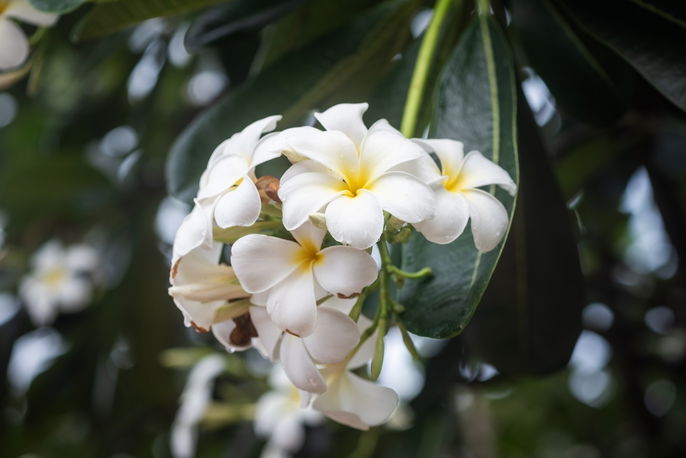Plumeria is a medicinal plant that can be used to help symptoms related to menstruation, like painful cramps or irregular periods. It can also be used to treat respiratory problems and prevent stomach issues.
The benefits of the plumeria plant are made possible due to its anti-inflammatory, analgesic, sedative, antispasmodic and laxative properties.
Plumeria can be used in the form of tea, capsules, tincture, or fluid extracts, which are prepared from the plant's flowers or bark.

Health benefits
Plumeria can be used for:
1. Treating menstrual symptoms
Plumeria contains analgesic and antispasmodic properties which can help to relieve menstrual cramps. It also has anti-inflammatory and ovary-stimulating action, which can be beneficial for treating uterine inflammation, some types of vaginal discharge, absence of a period, and irregular periods.
Also recommended: Period Cramp Relief: 10 Natural Tips tuasaude.com/en/period-cramp-relief2. Relieving respiratory symptoms
Plumeria can be used to complement the treatment of respiratory conditions, like asthma and bronchitis, as well as relieve symptoms like a cough or runny nose. It has anti-asthmatic and anti-inflammatory properties that can help to manage symptoms and speed-up recovery.
3. Protecting the stomach
Plumeria can play a role in optimizing the functioning of the gastric mucosa, or the lining of the stomach. Therefore, it can be used to prevent problems like upper abdominal pain, indigestion and gastritis.
Also recommended: How to Relieve Gastritis Pain Fast (with 10 Natural Remedies) tuasaude.com/en/home-remedies-for-gastritisHow to make plumeria tea
Plumeria tea can be prepared with the flowers or bark of the plant.
Ingredients:
- 10 g of plumeria flowers or bark
- 1 liter of water
Directions:
To make plumeria tea using its flowers, boil the water in a pot. Then remove from heat add the flowers. Cover, let it infuse for 5 minutes and then strain and consume 3 to 4 times a day.
To make plumeria tea with bark, the bark must be boiled together with water for approximately 15 minutes and then strained. This tea can also be consumed 3 to 4 times a day.
How to use plumeria
In addition to tea, there are other ways to use plumeria, such as:
- Plumeria capsules: capsules should be consumed in doses of 2g to 10g per day;
- Plumeria fluid extract: extract is produced from the leaves of the plant and should be used at a dose of 1 drop/kg/day, divided into 3 doses in a day;
- Plumeria tincture: tincture is a liquid extract made from the leaves of the plant, and should be used at a dose of 2 drops/kg/day divided 3 to 4 times a day.
Although the use of the plant is relatively simple and easily accessible, it is important to remember that medicinal plants should always be used as directed by a doctor or medicinal plant specialist.
Possible side effects
Excessive use of plumeria can lead to some side effects such as increased menstrual flow, miscarriage or diarrhea. Therefore, it is recommended that the plant be used only under the guidance of a doctor or medicinal plant specailist.
Contraindications for use
Plumeria is not recommended for children, pregnant or breastfeeding women. Furthermore, plumeria should not be used together with alcohol, as alcohol can enhance the effects of the plant.






























